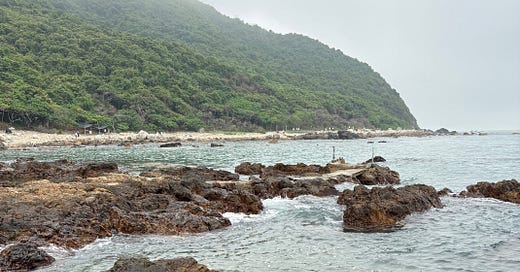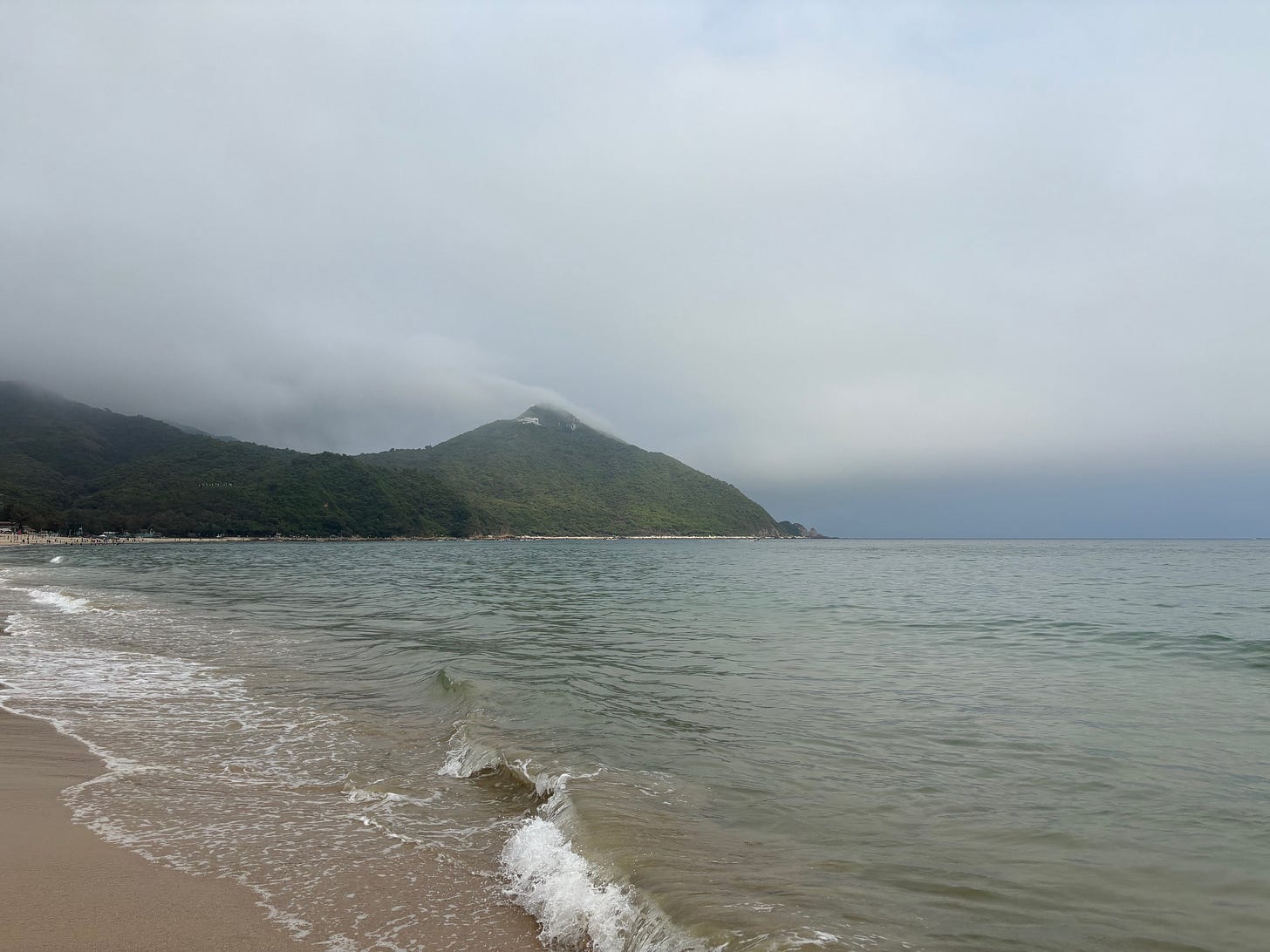Wilderness
a chorus of frogs at the edge of the nearby pond started harmonizing, attending to their springtime business
I took a short trip to a beach town outside of Shenzhen with the writer’s workshop that I attend here in Shanghai. Shenzhen is properly in the tropics, and it’s already intensely hot there in April. The air was heavy with humidity, and the smells of green things, and of the ever-wet earth that they grow in.
Less than a kilometer down the road from where we stayed, there’s a stretch of beach divided by a fence into a portion that you must pay to enter, and a stretch that anyone can walk down. The paid-entry portion is an actual beach used for human recreation, a stretch of sand lining a shallow bay edged in foothills. To the east of the sandy beach is rocky coastline rich with tidepools and boulders and small caverns cut into the stone by years of crashing tide. The moisture in the air thickened to low cloud cover that shrouded the hills at their tops, giving them a mysterious light-and-dark interplay, deepening their many greens. On either section of shoreline, you can sit and look out into the middle distance and feel like you’ve landed somewhere secluded, somewhere wild. Then you can look down into the water sucking at the sand and stone and see all the evidence that human beings are wont to leave behind: chip bags, empty Pringles tubes, bottles and glass and cast-off curls of metal siding. Amongst the tide pools are scattered broken sections of brick wall and other kinds of building detritus. It reminded me a little of the Leslie Street Spit in Toronto: an interesting place to consider the interface between human beings and our environment; not such a great place to swim or play.
Here in China, there are few places where one wouldn’t hear a single car all through a summer night; where the sky would be salted with stars after sundown. I’m sure that such places exist here, but they are fewer. This is a huge country with incredibly variable climates and ecosystems. It’s also densely populated and subject to forces of environmental racism of a kind that doesn’t impact Canadian ecosystems to the same extent – at least, not yet. Environmental racism looks different in Canada. It looks, among other things, like clean water from Shoal Lake for Winnipeg and unreliable potable water for rural, remote, and Northern communities, especially those on reserve or otherwise home to large Indigenous communities. It looks like ongoing misappropriation of land and broken treaties.
Romanticizing the Canadian wilderness is clichéd and potentially harmful, but it’s deeply engrained in me. I want to see stars. I want to see the aurora. I want to take a canoe out on a lake, find a quiet shore, and hear nothing but the wind and the smallest waves lapping at stone and sand for as long as I choose to sit there. I want my kids to have access to these things, too.
There is objectively a great deal of wilderness in China. Roughly 42% of this massive piece of land is wild. Much of Chinese wilderness is qualitatively different from wilderness in Canada. It’s more highly subdivided by human homes and amenities. It is impacted by human activity more sharply and more immediately, partly because of proximity and partly because of decades of intensive industry on the supply side of global capitalism over recent decades. The wilderness shares its air with the rest of the country. China has made huge strides in improving its air quality, and in moving toward more environmentally friendly practices overall, but the evidence of all of that industry is still in the air here. You can see it, smell it, taste it. It’s a barrier between us and the sky.
Of course, my semantic separations of human beings and nature don’t reflect reality all that well. Human beings are also animals. We are part of our ecosystems. We just happen to change them more starkly than most other species, and the forces we exert can be devastating for species human and non-human alike.
I think that writing this is just another way to say that I’m homesick. I want the things that are familiar and beloved to me. I vacillate between feeling intensely at a loss without my feet on familiar ground and then thrilled at the newness and potential for discovery around me. Many of the things that I notice and find fault with are superficial – the trash tossed in the surf near Shenzhen, for instance – even if they signify something greater: the ubiquity of microplastics in our water systems; the massive garbage patch out in the Pacific Ocean. I didn’t want to swim in the littered coastal waters near Shenzhen, but I also try not to swim in the Red River. Wilderness looks different here, but it exists. It’s mostly just that it’s more difficult for me to access, and that it isn’t home.
I’ve just started reading Jenny Odell’s Saving Time: Discovering a Life Beyond Productivity Culture. In the introductory chapter, she quotes Bill McKibben having written that “we are at the end of nature … By this I do not mean the end of the world. When I say ‘nature,’ I mean a certain set of human ideas about the world and our place in it.” Odell situates the quote in a story about a travel influencer visiting a Javanese volcano. She notes the volcano’s aliveness; its subjectivity and ability to act, even if there is no will behind its action. “The lava moves,” she writes, “and it’s not because of us.”
I have my own conception of and values about nature. I have an ideal of nature in my mind, and it is a subjective one built through years of a specific kind of experience. Ultimately, my conceptualization of nature is a colonial one. It makes a binary of humanity and nature. It makes it easier for me to internalize further erasure and assimilation of Indigenous people on Turtle Island: what I think of as wilderness has always been deeply intertwined with human communities. Living here, I often find my thinking, my many passively-made values, challenged, and I’m sometimes surprised at the ways those challenges might help me become a better member of my community back in Canada as well as here in China.
I sat on the grass at a park close to home to draft this post. As I came to the end of my draft, a chorus of frogs at the edge of the nearby pond started harmonizing, attending to their springtime business. Little orange fish flickered through the shallow water and yellow irises were just starting to wilt along the shoreline. When I got home to the kids, they talked over each other, excitedly explaining how they’d seen turtles and fish in the pond at another park in our neighbourhood. It’s not wilderness, and it’s not what I’m used to, but it’s beautiful anyway.






